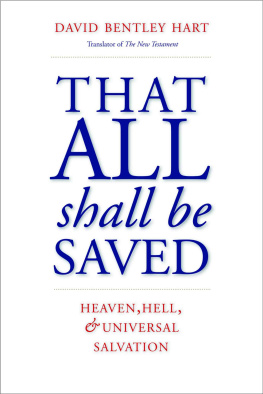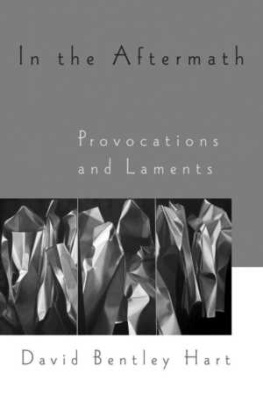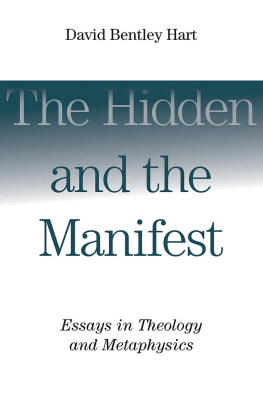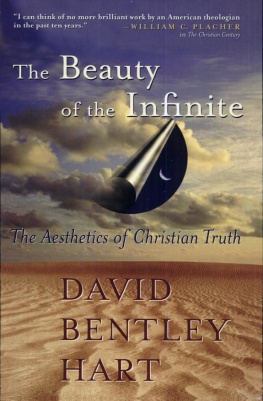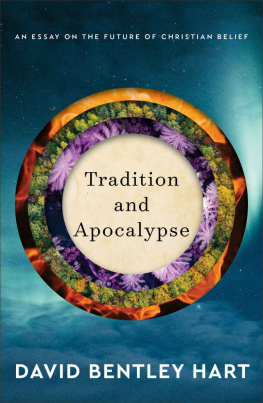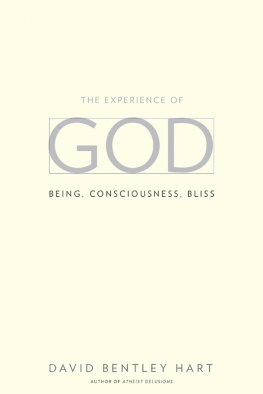ATHEIST DELUSIONS
DAVID BENTLEY HART
Atheist Delusions
THE CHRISTIAN REVOLUTION AND ITS FASHIONABLE ENEMIES
YALE UNIVERSITY PRESS NEW HAVEN & LONDON
Published with assistance from the Mary Cady Tew Memorial Fund.
Copyright 2009 by David Bentley Hart.
All rights reserved.
This book may not be reproduced, in whole or in part, including illustrations, in any form (beyond that copying permitted by Sections 107 and 108 of the U.S. Copyright Law and except by reviewers for the public press), without written permission from the publishers.
Set in FontShop Scala and Scala Sans by Duke & Company, Devon, Pennsylvania.
Printed in the United States of America by Sheridan Books, Ann Arbor, Michigan.
Library of Congress Cataloging-in-Publication Data
Hart, David Bentley.
Atheist delusions : the Christian revolution and its fashionable enemies / David Bentley Hart.
p. cm.
Includes bibliographical references and index.
ISBN 978-0-300-11190-3 (cloth : alk. paper) 1. Church historyPrimitive and early church, ca. 30600. 2. Civilization, Western. 3. ChristianityInfluence. I. Title.
BR162.3.H37 2009
909.09821dc22 2008040641
A catalogue record for this book is available from the British Library.
This paper meets the requirements of ANSI/NISO Z39.48-1992 (Permanence of Paper). It contains 30 percent postconsumer waste (PCW) and is certified by the Forest Stewardship Council (FSC).
10 9 8 7 6 5 4 3 2 1
For Solwyn
CONTENTS
INTRODUCTION
THIS BOOK IS IN NO SENSE an impartial work of history. Perfect detachment is impossible for even the soberest of historians, since the writing of history necessarily demands some sort of narrative of causes and effects, and is thus necessarily an act of interpretation, which by its nature can never be wholly free of prejudice. But I am not really a historian, in any event, and I do not even aspire to detachment. In what follows, my prejudices are transparent and unreserved, and my argument is in some respects willfully extreme (or so it might seem). I think it prudent to admit this from the outset, if only to avoid being accused later of having made some pretense of perfect objectivity or neutrality so as to lull the reader into a state of pliant credulity. What I have written is at most a historical essay, at no point free of bias, and intended principally as an apologia for a particular understanding of the effect of Christianity upon the development of Western civilization.
This is not to say, I hasten to add, that I am in any way forswearing claims of objective truth: to acknowledge that ones historical judgments can never be absolutely pure of preconceptions or personal convictions is scarcely to surrender to a thoroughgoing relativism. It may be impossible to provide perfectly irrefutable evidence for ones conclusions, but it is certainly possible to amass evidence sufficient to confirm them beyond plausible doubt, just as it is possible to discern when a particular line of interpretation has exceeded or contradicted the evidence altogether and become little better than a vehicle for the writers own predilections, interests, or allegiances. I can, moreover, vouch for the honesty of my argument: I have not consciously distorted any aspect of the history I discuss or striven to conceal any of its more disheartening elements. Such honesty costs me little, as it happens. Since the case I wish to make is not that the Christian gospel can magically transform whole societies in an instant, or summon the charity it enjoins out of the depths of every soul, or entirely extirpate cruelty and violence from human nature, or miraculously lift men and women out of their historical contexts, I feel no need to evade or excuse the innumerable failures of many Christians through the ages to live lives of charity or peace. Where I come to the defense of historical Christianity, it is only in order to raise objections to certain popular calumnies of the church, or to demur from what I take to be disingenuous or inane arraignments of Christian belief or history, or to call attention to achievements and virtues that writers of a devoutly anti-Christian bent tend to ignore, dissemble, or dismiss.
Beyond that, my ambitions are small; I make no attempt here to convert anyone to anything. Indeed, the issue of my personal belief or disbelief is quite irrelevant toand would be surprisingly unilluminating ofmy argument. Some of the early parts of this book, for instance, concern the Roman Catholic Church; but whatever I say in its defense ought not to be construed as advocacy for the institution itself (to which I do not belong), but only for historical accuracy. To be honest, my affection for institutional Christianity as a whole is rarely more than tepid; and there are numerous forms of Christian belief and practice for which I would be hard pressed to muster a kind word from the depths of my heart, and the rejection of which by the atheist or skeptic strikes me as perfectly laudable. In a larger sense, moreover, nothing I argue beloweven if all of it is grantedimplies that the Christian vision of reality is true. And yet, even so, the case I wish to make is intended to be provocative, and its more apologetic moments are meant to clear the way for a number of much stronger, and even perhaps somewhat immoderate, assertions.
This book chieflyor at least centrallyconcerns the history of the early church, of roughly the first four or five centuries, and the story of how Christendom was born out of the culture of late antiquity. My chief ambition in writing it is to call attention to the peculiar and radical nature of the new faith in that setting: how enormous a transformation of thought, sensibility, culture, morality, and spiritual imagination Christianity constituted in the age of pagan Rome; the liberation it offered from fatalism, cosmic despair, and the terror of occult agencies; the immense dignity it conferred upon the human person; its subversion of the cruelest aspects of pagan society; its (alas, only partial) demystification of political power; its ability to create moral community where none had existed before; and its elevation of active charity above all other virtues. Stated in its most elementary and most buoyantly positive form, my argument is, first of all, that among all the many great transitions that have marked the evolution of Western civilization, whether convulsive or gradual, political or philosophical, social or scientific, material or spiritual, there has been only onethe triumph of Christianitythat can be called in the fullest sense a revolution: a truly massive and epochal revision of humanitys prevailing vision of reality, so pervasive in its influence and so vast in its consequences as actually to have created a new conception of the world, of history, of human nature, of time, and of the moral good. To my mind, I should add, it was an event immeasurably more impressive in its cultural creativity and more ennobling in its moral power than any other movement of spirit, will, imagination, aspiration, or accomplishment in the history of the West. And I am convinced that, given how radically at variance Christianity was with the culture it slowly and relentlessly displaced, its eventual victory was an event of such improbability as to strain the very limits of our understanding of historical causality.
There is also, however, a negative side to my argument. It is what I suppose I should call my rejection of modernityor, rather, my rejection of the ideology of the modern and my rejection, especially, of the myth of the Enlightenment. By modernity, I should explain, I certainly do not mean modern medicine or air travel or space exploration or any of the genuinely useful or estimable aspects of life today; I do not even mean modern philosophical method or social ideology or political thought. Rather, I mean the modern ages grand narrative of itself: its story of the triumph of critical reason over irrational faith, of the progress of social morality toward greater justice and freedom, of the tolerance of the secular state, and of the unquestioned ethical primacy of either individualism or collectivism (as the case may be). Indeed, I want in part to argue that what many of us are still in the habit of calling the Age of Reason was in many significant ways the beginning of the eclipse of reasons authority as a cultural value; that the modern age is notable in large measure for the triumph of inflexible and unthinking dogmatism in every sphere of human endeavor (including the sciences) and for a flight from rationality to any number of soothing fundamentalisms, religious and secular; that the Enlightenment ideology of modernity


